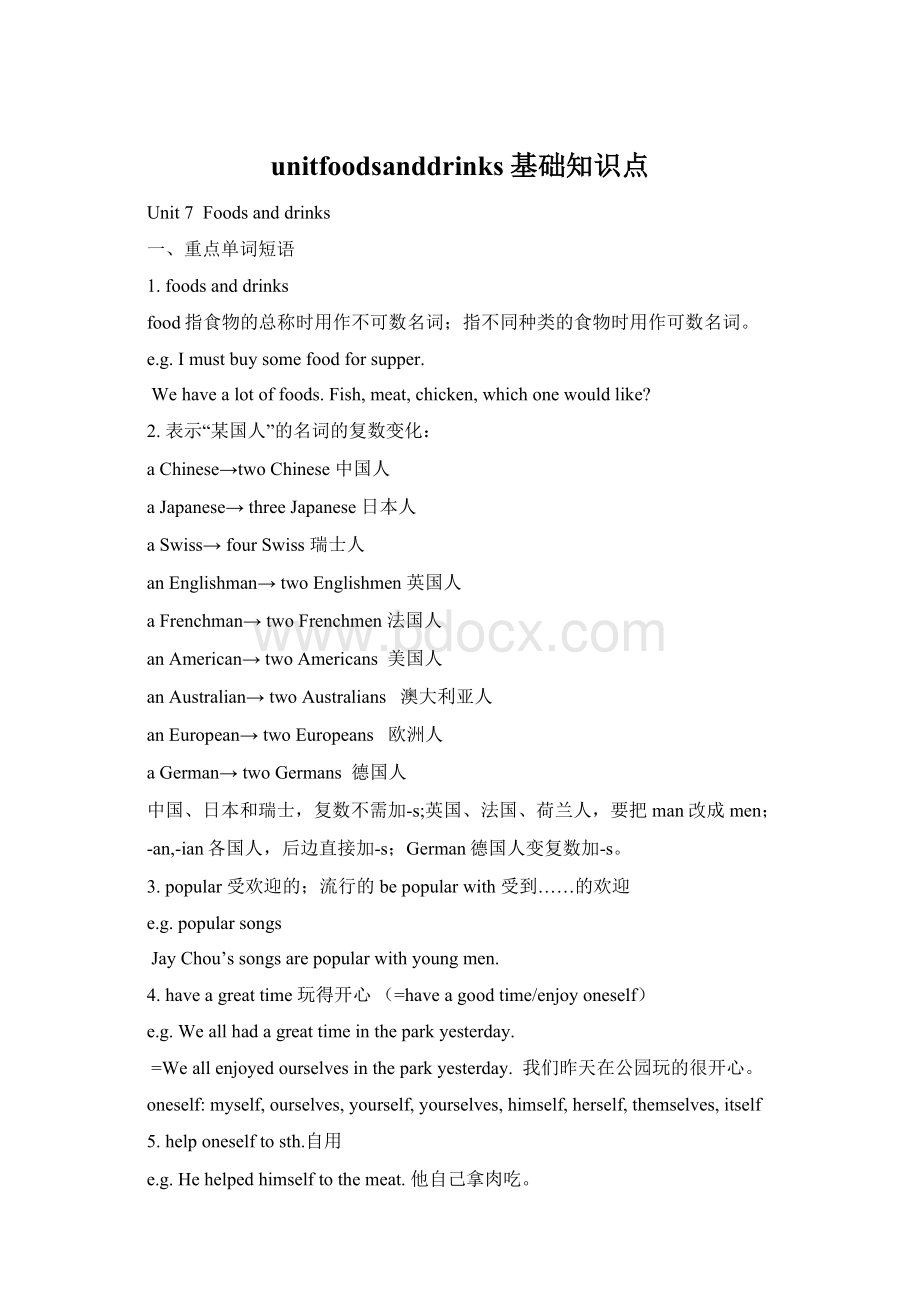unitfoodsanddrinks基础知识点.docx
《unitfoodsanddrinks基础知识点.docx》由会员分享,可在线阅读,更多相关《unitfoodsanddrinks基础知识点.docx(12页珍藏版)》请在冰豆网上搜索。

unitfoodsanddrinks基础知识点
Unit7Foodsanddrinks
一、重点单词短语
1.foodsanddrinks
food指食物的总称时用作不可数名词;指不同种类的食物时用作可数名词。
e.g.Imustbuysomefoodforsupper.
Wehavealotoffoods.Fish,meat,chicken,whichonewouldlike?
2.表示“某国人”的名词的复数变化:
aChinese→twoChinese中国人
aJapanese→threeJapanese日本人
aSwiss→fourSwiss瑞士人
anEnglishman→twoEnglishmen英国人
aFrenchman→twoFrenchmen法国人
anAmerican→twoAmericans美国人
anAustralian→twoAustralians澳大利亚人
anEuropean→twoEuropeans欧洲人
aGerman→twoGermans德国人
中国、日本和瑞士,复数不需加-s;英国、法国、荷兰人,要把man改成men;
-an,-ian各国人,后边直接加-s;German德国人变复数加-s。
3.popular受欢迎的;流行的bepopularwith受到……的欢迎
e.g.popularsongs
JayChou’ssongsarepopularwithyoungmen.
4.haveagreattime玩得开心(=haveagoodtime/enjoyoneself)
e.g.Weallhadagreattimeintheparkyesterday.
=Weallenjoyedourselvesintheparkyesterday.我们昨天在公园玩的很开心。
oneself:
myself,ourselves,yourself,yourselves,himself,herself,themselves,itself
5.helponeselftosth.自用
e.g.Hehelpedhimselftothemeat.他自己拿肉吃。
6.cutoff切下
e.g.Hecutoffapieceofbreadandgaveittome.他切下一片面包给我。
e.g.IwillcallyouassoonasIgetbackhome.我一回家就给你打电话。
cut…intopieces把……切成碎片
e.g.Shecuttheappleintosmallpieces.她把苹果切成小块。
7.indifferentways用不同的方法
e.g.Thefourboysfinishedtheworkindifferentways.
和way相关的短语:
onone’swayto在某人去……的路上
e.g.Imetanoldfriendonmywaytocompany.
注意:
onone’swayhome在某人回家的路上
bytheway顺便说一下
e.g.Bytheway,doyouknowher?
inthatway用那种方法
e.g.Ithinkyoucanfinishtheworkinthatway.
8.farfrom离……远
e.g.Helivesfarfromhisschool.
Myhomeisnotfarfromthepark.
9.assoonas…一……就……表示一个动作发生了,另一个动作紧接着发生
e.g.Iwilltellhimthenewsassoonashecomesback.
注意:
assoonas引导的时间状语从句中,主语是一般将来时,从句用一般现在时表示将来。
类似的用法还有if(如果)引导的条件状语从句和when引导的时间状语从句。
e.g.Wewillvisittheparkifitdoesn’traintomorrow.
Tomwillplaybasketballwithhisfriendswhenhefinisheshishomework.
10.alittle,afew,abit一点
alittle修饰不可数名词,意为“一点”;little修饰不可数名词,意为“几乎没有”,含否定意义。
e.g.alittlewateralittlemilk
Thereislittlefood.Weshouldbuysomeforlunch.
afew修饰可数名词,意为“一些”;few修饰可数名词,意为“几乎没有”,含否定意义。
e.g.afewstudentsafewbooks
Thereareafewapplesonthedesk.
abit修饰可数名词需加上of
e.g.abitofwaterabitofmilk
notalittle相当于very(much)“非常”;notabit相当于notatall意为“一点儿都不”
e.g.Sheisnotalittletired.=Sheisverytired.
Sheisnotabittired.=Sheisnottiredatall.
11.begoodfor对……有好处begoodto…对……好begoodat…擅长于
bebadfor…对……不好
e.g.Eatingmorefruitsisgoodforyourhealth.多吃水果对你的健康有益。
12.besureto…一定
e.g.Youaresuretowinthematch.你一定会赢得比赛的。
13.nowonder难怪
e.g.Nowonderyouaresohappytoday—it’syourbirthdaytoday
难怪你今天这么开心——原来今天是你的生日。
14.startwith…以……开始同义词:
beginwith
反义词:
endupwith以……结束
e.g.MissGreenoftenstartsherlessonswithanEnglishsong.
Thepartyendedupwithamusic.
15.stopdoingsth.停止做某事
stoptodosth.停下来做另外一件事
e.g.Theyweretiredandstoppedwalking.他们累了,没有走了。
Theyweretiredandstoppedtohavearest.他们累了,停下来休息。
二、重点句型
1.Itistimeto/for…到时间……;该做某事了
Itistimeforsb.todosth.某人该做某事了
e.g.Itistimetogotobed.该睡觉了
Itistimeforclass.该上课了。
Itistimeforustohavearest.我们该休息了。
2.Canyouhelpmewith…?
能帮我……吗?
e.g.Canyouhelpmewithmybag?
能帮我拿下包吗?
helpsb.(to)dosth.帮某人做某事
helpsb.withsth.帮某人某事
e.g.MaryalwayshelpsmetolearnEnglish.
MaryalwayshelpswithmyEnglish.
3.oneof+复数名词其中之一
oneof+形容词最高级+复数名词
e.g.Thisisoneofmyfavoritesports.
这是我最喜欢的运动之一。
Thisisoneofthemostinterestingbooks.
这是最有趣的书之一。
4.havetroubledoingsth.做某事有苦难
e.g.Theyhadtroublefinishingthejob.
5.It+be+adj.+forsb.todosth对于某人来说做某事是….adj.为形容事物属性的形容词
e.g.Itisdangerousforyoutoswiminthatriver.
区分:
It+be+adj.+ofsb.todosth.表示某人这么做真是太….了。
adj.为形容人的品格的形容词
e.g.Itiskindofyoutohelpme.
6.Thankyouverymuchforyourhelp.非常感谢你的帮助。
thanksb.for(doing)sth.因某事感谢某人
e.g.Thankyouverymuchforhelpingme.
7.What’sforsupper?
晚饭吃什么?
havesth.forbreakfast/lunch/supper早餐(午餐、晚餐)吃……
e.g.Wehadfishforlunchyesterday.
8.Wouldyoulikesomesoup?
你想要一些汤吗?
wouldlike意为“想,想要”,与want意义相同,但语气更委婉。
wouldlike可与任何人称连用,没有人称和数的变化,肯定句中would常在主语后面缩写为’d。
1.wouldlikesth.“想要某物”。
e.g.—Wouldyoulikeacupoftea?
—Yes,please./No,thanks.
2.wouldliketodosth.“想要做某事”。
如:
e.g.—Wouldyouliketogoshoppingwithme?
—Yes,I’dliketo./I’dliketo,butIhavetodomyhomework.
3.wouldlikesbtodosth“想要某人做某事”。
如:
e.g.JimwouldlikehisfriendtohelphimwithhisEnglish.
四、重点语法——现在完成时
1.for/since;already/yet;ever/never的区别
(1).for/since的区别
for后常跟一个时间段,如forthreeyears,forhalfanhour等。
since作介词,后面可以接一个时间点,如since1980;
也可以接“一段时间+ago”,如:
sincethreeyearsago,sincetwomonthsago等;
since还可用作连词,引导一个过去时态的时间状语从句。
e.g.Wehaveknowneachothersincewewerechildren.
(2).already/yet的区别
already,“已经”用于肯定句中,可放句首、句中和句尾。
yet意为“还,仍”用于否定句或疑问句中,且常放在句尾。
e.g.Ihavealreadyfinishedmywork.
Ihaven’tfinishedmyworkyet.
Haveyoufinishedyouworkyet?
(3).ever/never的区别
ever意为“曾经”,常用句型Haveyouever...?
其否定回答常用never。
e.g.HaveyoueverbeentoBeijing?
(否定回答)Never.
2.结构:
have/has+过去分词
肯定式:
主语+have/has+过去分词……
e.g.Hehasreadthestorybefore.他以前读过这个故事。
否定式:
主语+have/has+not+过去分词……
e.g.Ihaven’tfoundmybag.我还没找到我的包。
疑问式:
Have/Has+主语+过去分词……?
—Haveyoureadthebookbefore?
你以前读过那本书吗?
—Yes,Ihave.是的,我读过。
(肯定回答)
—No,Ihaven’t.不,还没有。
(否定回答)
3.时态意义:
(1)表示过去发生或已经完成的动作对现在产生的影响或是造成的后果;这时常与already,just,yet等词连用。
e.g.Hehasjustgoneout.他刚出去。
Ihavealreadyfinishedmyhomework.我已经完成我的家庭作业。
Haveyouseenfilmyet?
你看过那部电影了吗?
(2)表示过去已经开始,持续到现在的动作或状态。
常与never,ever等次连用。
e.g.Hehasneverbeenlateforwork.他上班从没迟到。
—Haveyoueverclimbedthatmountain?
你爬过那座山吗?
—Yes,severaltimes.是的,爬过几次。
4.和一般过去式的用法区别
这两个时态都说明过去已经发生的事情。
现在完成时表示的动作与现在有关系或对现在有影响;而一般过去只表示过去的的事,与现在没什么联系。
当句中有明确的过去的时间状语的时候,只能用一般过去时。
e.g.IhavefinishedtheworkandIcanhavearestnow.
我完成了工作,现在能休息了。
Ifinishedmyworkyesterday.
我昨天完成了工作。
注意:
常和现在完成时利用的时间状语有lately,recently,inthepastfewyears,thesefewyears,thesedays,uptonow,sofar等,而不能和yesterday,lastweek,in2002,threedaysago等表示过去时间的状语连用。
练习
一、单词拼写。
1.Eatingtoomuchc_______isbadforyourteeth.
2.InJapan,somepeoplelikeeatingf_______fish.
3.Ifyouwanttokeephealth,youshouldformgoodeatingh__________.
4.Chinesefoodhasbecomep_________inAmericaninrecentyears.
5.Allthew_________intherestaurantareverykindtocustomer.
6.InChina,mostpeopleeatwith___________.(筷子)
7.TheEuropeansusuallyuseak________andaf________toeatsteak.
8.Thegrapesare___________(生的),youhadbetternoteatit.
9.WevisitedMr.Liyesterday.Theh___________,Mrs.Li,cookedsomedeliciousfoodforus.
10.Everychildinmyfamilyhasa________(各自的)room.
二、翻译词组。
1.不同的方法__________________2.切下_____________________
3.自用____________________4.玩得开心__________________
5.把……切成碎片____________________6.难怪____________________
7.一……就____________________8.以……开始___________________
二、单项选择
()1.Thestudentshurriedtoschool_____thebellrang.
A.untilB.assoonasC.ifD.sothat
()2.WatchingTVtoomuchisnotgood_____youreyes.
A.forB.toC.onD.at
()3.Comeon,children._____tosomefishifyoulike.
A.helpthemselvesB.helpyourself
C.helpyourselvesD.helpthemselves
()4.—I’mhungry.
—Let’sgotothenearestsupermarket_____somefood.
A.buyB.tobuyC.boughtD.havebought
()5.Shesometimescomestomyhouseandhelpsme_____myEnglish.
A.atB.withC.toD.on
()6.Myteacher_____usthreesongsalready.She______onelastweek.
A.hastaught;taughtB.teaches;teaches
C.willteach;hastaughtD.taught;taught
()7.—WhereisTom?
Doyouknow?
—Ithinkhe_____tothelibrary.
A.hasgoneB.goesC.hasbeenD.went
()8.—Iamafraidyourradioistoonoisy.
—Sorry,I’ll_____.
A.turnitoffB.turndownit
C.turnoffitD.turniton
()9.Ihavefinishedmyhomework_____.
A.yetB.tooC.alreadyD.then
()10.UncleWanghasworkedinthisfactory_____tenyearsago.
A.inB.forC.sinceD.after
()11.ZhaoFang_____already_____intheschoolfortwoyears.
A.was;studyingB.willstudy
C.has;studiedD.are;studying
()12.Didyouenjoy_____attheparty,John?
A.himselfB.yourselvesC.herselfD.yourself
()13.—Whatabouthavingsomecoffee?
—_____.
A.HelpyourselfB.Goodidea
C.IwantD.Itdoesn’tmatter
()14.Eatingtoomanysweets_____bad_____yourteeth.
A.is;forB.are;forC.is;toD.are;to
()15.Chineseliketea_____anythinginit.
A.withB.withoutC.hasD.hasn’t
三、用already,yet,ever,never,since,for填空。
1.Hehasworkedinthatfactory______itopened20yearsago.
2.I’mnothungry.Ihave_____hadbreakfast.
3.—Haveyou_____beentotheGreatWall?
—Yes,Ihavebeenheretwice.
4.Ihave_____beentoParis,soIwanttogothereforthefirsttime.
5.Ihavewaitedforthebusforhalfanhour,butithasn’tarrived_____.
6.WehavestudiedEnglish_____abouttwoyears.
四、根据中文意思完成句子。
(没空一词)
1.我们彼此认识10年了。
We__________eachother________________.
2.他自从离开学校,就在这间工厂工作。
He__________inthisfactory_____he_____school.
3.我已经把书还给图书馆了。
I________________thebookstothelibrary.
4.他们从来没见过这么高的房子。
They_______________suchahighbuilding.
5.汤姆还没完成他的作业。
Tom___________hishomework_____.
【附】动词过去式,过去分词的变化
1、规则动词:
规则动词的过去分词的构成规则与规则动词的过去式的构成规则相同。
(1)一般动词,直接在词尾加“ed”。
work---worked---worked,visit---visited---visited
(2